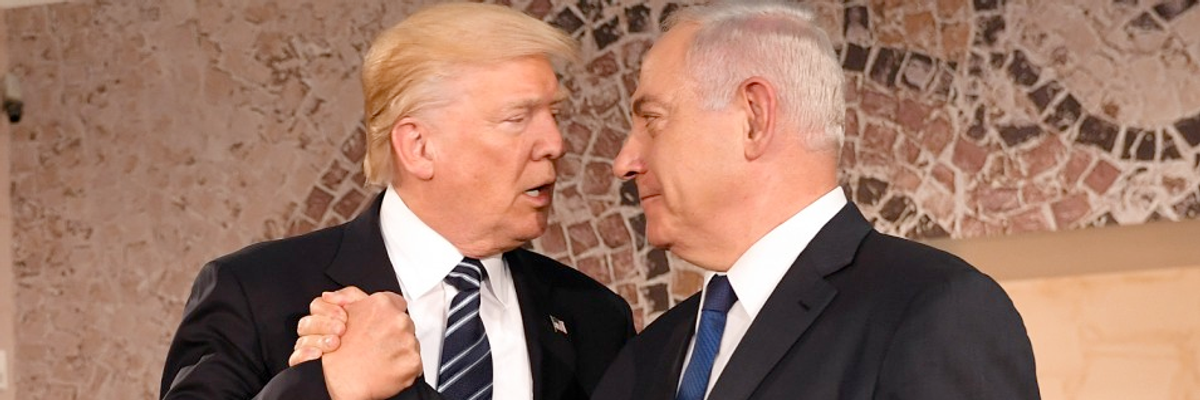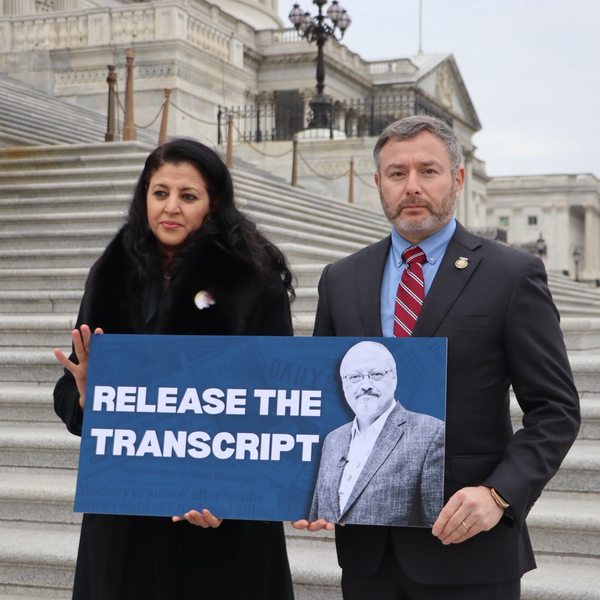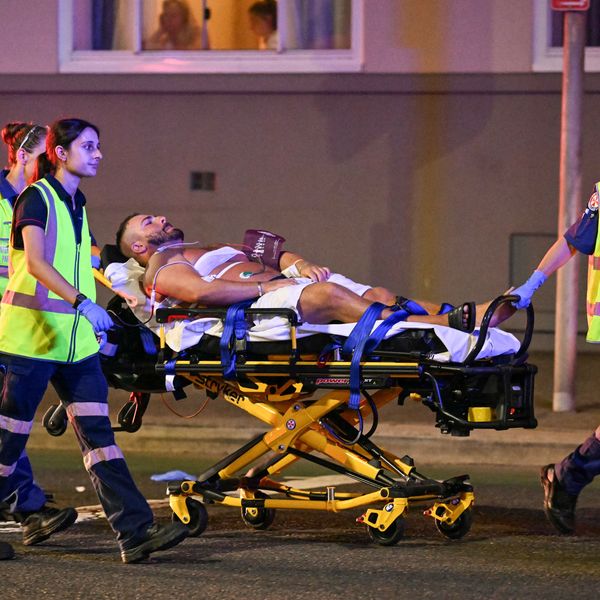
While publicly condemning the murder of Jamal Khashoggi on Friday, Israeli Prime Minister Benjamin Netanyahu emphasized the importance of Saudi Arabia as a strategic regional partner and has reportedly has urged the Trump administration to maintain support for Saudi Crown Prince Mohammed bin Salman. (Photo: Wikimedia Commons)
Netanyahu: Brutal Murder of Khashoggi by Saudis 'Horrendous,' But... 'Larger Problem Is Iran'
The Israeli prime minister's first public comments on the killing come amid reports he urged the Trump administration to stand by Saudi Crown Prince Mohammed bin Salman
As the global community continues to demand justice for murdered Washington Post columnist and Saudi Arabian dissident Jamal Khashoggi, Israeli Prime Minister Benjamin Netanyahu, in his first public comments, described Khashoggi's killing at the Saudi consulate in Istanbul last month as "horrendous" before immediately defending Saudi Arabia as strategically important to counter Iran.
"What happened in the Istanbul consulate was horrendous and it should be duly dealt with. Yet at the same time I say it, it is very important for the stability of the world, for the region and for the world, that Saudi Arabia remain stable," Netanyahu told reporters after a diplomatic meeting in Varna, Bulgaria on Friday. "I think that a way must be found to achieve both goals. Because I think that the larger problem is Iran."
Earlier on Friday, Energy Minister Yuval Steinitz, a member of the prime minister's security cabinet, had said in a radio interview that Khashoggi's murder "was a despicable action. It's worthy of all reproach. This was a civilian, a journalist, not a terrorist," but also that "Arab states, including Saudi Arabia, are our allies in recent years against the spread of Iran and against the Iranian nuclear threat." Iran maintains that it is not trying to build nuclear weapons and international watchdogs have found the nation in compliance with the 2015 nuclear deal.
The Israelis' remarks followed a Washington Post report on Thursday that Netanyahu had privately urged the United States to maintain support for Saudi Crown Prince Mohammed bin Salman, or MbS. According to the Post, in recent days, autocratic Egyptian President Abdel Fatah al-Sissi and Netanyahu have "reached out to the Trump administration to express support for the crown prince, arguing that he is an important strategic partner in the region."
As details of the grisly killing have emerged, MbS has faced heightened scrutiny over suspicions that he was involved in a plot to assassinate Khashoggi. Saudi Arabia has changed its official story multiple times since the dissident entered the consulate on Oct. 2 and never reemerged. Initially, the kingdom said Khashoggi left the facility unharmed, before claiming he died in a "fistfight" gone wrong. The country's attorney general finally admitted last week that, as Turkish officials have alleged for weeks, the murder was premeditated.
While President Donald Trump has revoked visas or limited travel for 21 individuals accused of being involved with the murder, the president has accepted the crown prince's denials that he never had "any knowledge of what took place in their Turkish consulate." Trump also has resisted pressure from the public and politicians to cut off arms sales and military support for Saudi Arabia as it wages war on Yemen, where the Saudi and UAE-led coalition's bombing campaign has created the world's worst humanitarian crisis.
The Post also reported Thursday that the crown prince has spoken with Trump's son-in-law and senior adviser Jared Kushner, arguably his top ally in the Trump administration, multiple times since Khashoggi was killed--including a call with Kushner and National Security Adviser John Bolton in which the MbS alleged that Khashoggi was "a dangerous Islamist" affiliated with the Muslim Brotherhood.
Echoing Khashoggi's repeated denials over the years that he was affiliated with the Egypt-based organization, his family said in a statement: "Jamal Khashoggi was not a dangerous person in any way possible. To claim otherwise would be ridiculous."
Khashoggi's fiancee, Hatice Cengiz, on Friday requested that his remains be turned over for a proper burial. However, Turkish presidential adviser Yasin Aktay told the Hurriyet Daily News this week that he believes Khashoggi's body was cut up then dissolved in acid. "Now we see that they did not only dismember his body but also vaporized it," Aktay said. "The reason they dismembered Khashoggi's body was to dissolve his remains more easily."
This post has been updated to include comment from Turkish presidential adviser Yasin Aktay and details about Jamal Khashoggi's remains.
An Urgent Message From Our Co-Founder
Dear Common Dreams reader, The U.S. is on a fast track to authoritarianism like nothing I've ever seen. Meanwhile, corporate news outlets are utterly capitulating to Trump, twisting their coverage to avoid drawing his ire while lining up to stuff cash in his pockets. That's why I believe that Common Dreams is doing the best and most consequential reporting that we've ever done. Our small but mighty team is a progressive reporting powerhouse, covering the news every day that the corporate media never will. Our mission has always been simple: To inform. To inspire. And to ignite change for the common good. Now here's the key piece that I want all our readers to understand: None of this would be possible without your financial support. That's not just some fundraising cliche. It's the absolute and literal truth. We don't accept corporate advertising and never will. We don't have a paywall because we don't think people should be blocked from critical news based on their ability to pay. Everything we do is funded by the donations of readers like you. Will you donate now to help power the nonprofit, independent reporting of Common Dreams? Thank you for being a vital member of our community. Together, we can keep independent journalism alive when it’s needed most. - Craig Brown, Co-founder |
As the global community continues to demand justice for murdered Washington Post columnist and Saudi Arabian dissident Jamal Khashoggi, Israeli Prime Minister Benjamin Netanyahu, in his first public comments, described Khashoggi's killing at the Saudi consulate in Istanbul last month as "horrendous" before immediately defending Saudi Arabia as strategically important to counter Iran.
"What happened in the Istanbul consulate was horrendous and it should be duly dealt with. Yet at the same time I say it, it is very important for the stability of the world, for the region and for the world, that Saudi Arabia remain stable," Netanyahu told reporters after a diplomatic meeting in Varna, Bulgaria on Friday. "I think that a way must be found to achieve both goals. Because I think that the larger problem is Iran."
Earlier on Friday, Energy Minister Yuval Steinitz, a member of the prime minister's security cabinet, had said in a radio interview that Khashoggi's murder "was a despicable action. It's worthy of all reproach. This was a civilian, a journalist, not a terrorist," but also that "Arab states, including Saudi Arabia, are our allies in recent years against the spread of Iran and against the Iranian nuclear threat." Iran maintains that it is not trying to build nuclear weapons and international watchdogs have found the nation in compliance with the 2015 nuclear deal.
The Israelis' remarks followed a Washington Post report on Thursday that Netanyahu had privately urged the United States to maintain support for Saudi Crown Prince Mohammed bin Salman, or MbS. According to the Post, in recent days, autocratic Egyptian President Abdel Fatah al-Sissi and Netanyahu have "reached out to the Trump administration to express support for the crown prince, arguing that he is an important strategic partner in the region."
As details of the grisly killing have emerged, MbS has faced heightened scrutiny over suspicions that he was involved in a plot to assassinate Khashoggi. Saudi Arabia has changed its official story multiple times since the dissident entered the consulate on Oct. 2 and never reemerged. Initially, the kingdom said Khashoggi left the facility unharmed, before claiming he died in a "fistfight" gone wrong. The country's attorney general finally admitted last week that, as Turkish officials have alleged for weeks, the murder was premeditated.
While President Donald Trump has revoked visas or limited travel for 21 individuals accused of being involved with the murder, the president has accepted the crown prince's denials that he never had "any knowledge of what took place in their Turkish consulate." Trump also has resisted pressure from the public and politicians to cut off arms sales and military support for Saudi Arabia as it wages war on Yemen, where the Saudi and UAE-led coalition's bombing campaign has created the world's worst humanitarian crisis.
The Post also reported Thursday that the crown prince has spoken with Trump's son-in-law and senior adviser Jared Kushner, arguably his top ally in the Trump administration, multiple times since Khashoggi was killed--including a call with Kushner and National Security Adviser John Bolton in which the MbS alleged that Khashoggi was "a dangerous Islamist" affiliated with the Muslim Brotherhood.
Echoing Khashoggi's repeated denials over the years that he was affiliated with the Egypt-based organization, his family said in a statement: "Jamal Khashoggi was not a dangerous person in any way possible. To claim otherwise would be ridiculous."
Khashoggi's fiancee, Hatice Cengiz, on Friday requested that his remains be turned over for a proper burial. However, Turkish presidential adviser Yasin Aktay told the Hurriyet Daily News this week that he believes Khashoggi's body was cut up then dissolved in acid. "Now we see that they did not only dismember his body but also vaporized it," Aktay said. "The reason they dismembered Khashoggi's body was to dissolve his remains more easily."
This post has been updated to include comment from Turkish presidential adviser Yasin Aktay and details about Jamal Khashoggi's remains.
As the global community continues to demand justice for murdered Washington Post columnist and Saudi Arabian dissident Jamal Khashoggi, Israeli Prime Minister Benjamin Netanyahu, in his first public comments, described Khashoggi's killing at the Saudi consulate in Istanbul last month as "horrendous" before immediately defending Saudi Arabia as strategically important to counter Iran.
"What happened in the Istanbul consulate was horrendous and it should be duly dealt with. Yet at the same time I say it, it is very important for the stability of the world, for the region and for the world, that Saudi Arabia remain stable," Netanyahu told reporters after a diplomatic meeting in Varna, Bulgaria on Friday. "I think that a way must be found to achieve both goals. Because I think that the larger problem is Iran."
Earlier on Friday, Energy Minister Yuval Steinitz, a member of the prime minister's security cabinet, had said in a radio interview that Khashoggi's murder "was a despicable action. It's worthy of all reproach. This was a civilian, a journalist, not a terrorist," but also that "Arab states, including Saudi Arabia, are our allies in recent years against the spread of Iran and against the Iranian nuclear threat." Iran maintains that it is not trying to build nuclear weapons and international watchdogs have found the nation in compliance with the 2015 nuclear deal.
The Israelis' remarks followed a Washington Post report on Thursday that Netanyahu had privately urged the United States to maintain support for Saudi Crown Prince Mohammed bin Salman, or MbS. According to the Post, in recent days, autocratic Egyptian President Abdel Fatah al-Sissi and Netanyahu have "reached out to the Trump administration to express support for the crown prince, arguing that he is an important strategic partner in the region."
As details of the grisly killing have emerged, MbS has faced heightened scrutiny over suspicions that he was involved in a plot to assassinate Khashoggi. Saudi Arabia has changed its official story multiple times since the dissident entered the consulate on Oct. 2 and never reemerged. Initially, the kingdom said Khashoggi left the facility unharmed, before claiming he died in a "fistfight" gone wrong. The country's attorney general finally admitted last week that, as Turkish officials have alleged for weeks, the murder was premeditated.
While President Donald Trump has revoked visas or limited travel for 21 individuals accused of being involved with the murder, the president has accepted the crown prince's denials that he never had "any knowledge of what took place in their Turkish consulate." Trump also has resisted pressure from the public and politicians to cut off arms sales and military support for Saudi Arabia as it wages war on Yemen, where the Saudi and UAE-led coalition's bombing campaign has created the world's worst humanitarian crisis.
The Post also reported Thursday that the crown prince has spoken with Trump's son-in-law and senior adviser Jared Kushner, arguably his top ally in the Trump administration, multiple times since Khashoggi was killed--including a call with Kushner and National Security Adviser John Bolton in which the MbS alleged that Khashoggi was "a dangerous Islamist" affiliated with the Muslim Brotherhood.
Echoing Khashoggi's repeated denials over the years that he was affiliated with the Egypt-based organization, his family said in a statement: "Jamal Khashoggi was not a dangerous person in any way possible. To claim otherwise would be ridiculous."
Khashoggi's fiancee, Hatice Cengiz, on Friday requested that his remains be turned over for a proper burial. However, Turkish presidential adviser Yasin Aktay told the Hurriyet Daily News this week that he believes Khashoggi's body was cut up then dissolved in acid. "Now we see that they did not only dismember his body but also vaporized it," Aktay said. "The reason they dismembered Khashoggi's body was to dissolve his remains more easily."
This post has been updated to include comment from Turkish presidential adviser Yasin Aktay and details about Jamal Khashoggi's remains.

